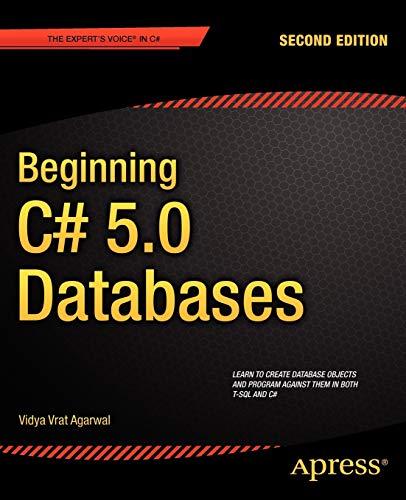Question
Python NLTK Provide a set of regular expression patterns for chunking different types of participle phrases, based on the following description of Participle phrases adapted
Python NLTK
Provide a set of regular expression patterns for chunking different types of participle phrases, based on the following description of Participle phrases adapted from R. Simmons and the patterns for common noun phrases and verb phrases described in the NLTK book. (Note that her analysis is slightly different than that provided by coreNLP, but you do not need to determine what is being modified.)
A participle phrase will begin with a present or past participles.
Since all phrases require two or more words, a participle phrase will often include objects and/or modifiers that complete the thought.
Here are some examples:
Crunching caramel corn for the entire movie
Washed with soap and water
Stuck in the back of the closet behind the obsolete computer
Participle phrases always function as adjectives, adding description to the sentence.
Read these examples:
The horse trotting up to the fence hopes that you have an apple or carrot.
Trotting up to the fence modifies the noun horse.
The water drained slowly in the pipe clogged with dog hair.
Clogged with dog hair modifies the noun pipe.
Eaten by mosquitoes, we wished that we had made hotel, not campsite, reservations.
Eaten by mosquitoes modifies the pronoun we.
(But) Don't mistake a present participle phrase for a gerund phrase.
Gerund and present participle phrases are easy to confuse because they both begin with an ing word. The difference is the function that they provide in the sentence. A gerund phrase will always behave as a noun while a present participle phrase will act as an adjective. Check out these examples:
Walking on the beach, Delores dodged jellyfish that had washed ashore. Walking on the beach = present participle phrase describing the noun Delores. [Or it is an adverbial modifying dodged, see coreNLP]
Walking on the beach is painful if jellyfish have washed ashore.
Walking on the beach = gerund phrase, the subject of the verb is.
Waking to the buzz of the alarm clock, Freddie cursed the arrival of another Monday.
Waking to the buzz of the alarm clock = present participle phrase describing the noun Freddie.
Freddie hates waking to the buzz of the alarm clock.
Waking to the buzz of the alarm clock = gerund phrase, the direct object of the verb hates.
After a long day at school and work, LaShae found her roommate Ben eating the last of the leftover pizza.
Eating the last of the leftover pizza = present participle phrase describing the noun Ben.
Ben's rudest habit is eating the last of the leftover pizza.
Eating the last of the leftover pizza = gerund phrase, the subject complement of the linking verb is.
In clear, logical sentences, you will find modifiers right next to the words they describe (otherwise they are misplaced or dangling).
Below is correct. Shouting with happiness, William celebrated his chance to interview at SunTrust.
Test your chunker on a set of at least 50 sentences and calculate the precision (proportion that are correct among the set labelled as partciple) and recall (proportion of correct that are recognized) based on your own judgement.
Step by Step Solution
There are 3 Steps involved in it
Step: 1

Get Instant Access to Expert-Tailored Solutions
See step-by-step solutions with expert insights and AI powered tools for academic success
Step: 2

Step: 3

Ace Your Homework with AI
Get the answers you need in no time with our AI-driven, step-by-step assistance
Get Started


